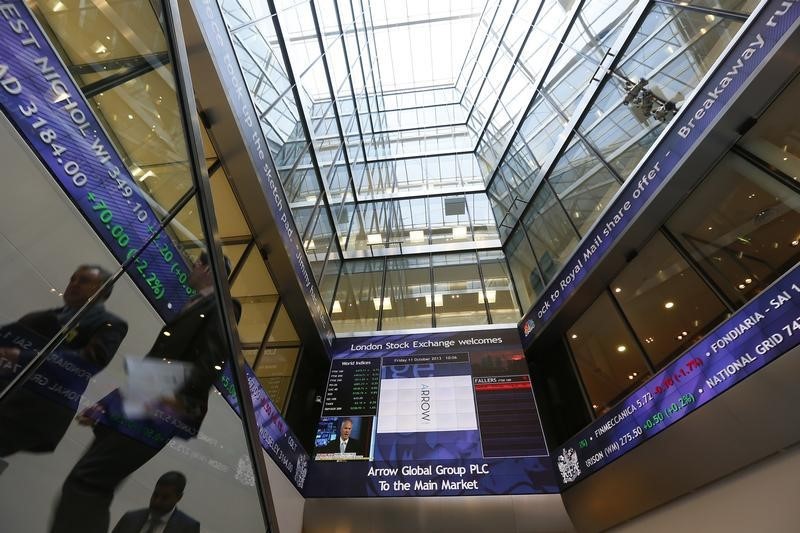Proactive Investors -
- FTSE 100 edges 20 points higher
- Rolls Royce (LON:RR) leads risers, up 9% on "stellar" 2023
- Beazley (LON:BEZG) up 8.5% on trading update
FTSE 100 picks up momentum as PMI data provides confidence
The FTSE 100 is climbing higher, up around 20 points, after flash PMI figures filled investors with fresh optimism that the UK may be exiting its recession.
Martin Beck, the chief economic advisor at EY ITEM Club, said: "February's PMIs reinforce [our] view that the economy's contraction in the second half of last year should prove short-lived.
"The activity surveys point to GDP returning to growth in the current quarter, albeit with the pace of expansion in Q1 held back by the effects of public sector strikes. Over the course of this year, the EY ITEM Club expects lower inflation to support real incomes and drive a recovery in activity."
Strong jumps from Rolls Royce and Beazley, both up around 9%, are helping offset falls from WPP (LON:WPP) (-4%) and AstraZeneca (NASDAQ:AZN) (-2%).
The FTSE 250 soared by around 125 points to around 19,244 as news that Indivior is considering shifting its listing to the US helped the stock rally 17% higher.
The pharmaceutical company, known for making opioid dependence treatments, said it will begin speaking with shareholders to discuss whether it should move its primary listing over to Wall Street.
Indivior's gains are helping offset falls from Hargreaves Lansdown (LON:HRGV) after its shares sunk 7.5%.
The financial services firm said new business had dropped around 38% to £1 billion, while pre-tax profits tumbled 8% to £183 million.
Potato prices soar as wet weather causes supply issues
Potato prices soared more than 20% in the last month, as farmers continue to battle with poor weather conditions.
Sainsbury 's (LON:SBRY) British Maris Piper Potatoes (2kg) jumped by 22.2% month-on-month in February from £1.35 to £1.65, while the same item at Tesco (LON:TSCO) saw a 21.3% increase.
Wet weather was the leading cause for the disruption, however, Tim Rooke, the NFU potato and policy chair, believes the problems truly began in the summer of 2022 when a drought caused supply issues.
Speaking on the fall in the number of potatoes in storage, he said: “The crop we are using at the moment potentially has to go maybe two months longer.
“I think there could potentially be a shortage by the end of the season."
Bank of England policymaker needs more evidence before rate cut
Bank of England policymaker and economist Megan Greene believes more evidence is required before she votes to cut rates.
Greene wants to see clearer proof that inflation pressures are easing, having only decided to drop the call to raise rates at the start of February.
"Markets are pressuring every central bank to cut rates. I would need to wait to see more evidence that inflation wasn't as entrenched as we may fear before I would be willing to vote (for a cut)," she said.
The comments echo those made by Bank of England governor Andrew Bailey, who defended the decision to hold rates, arguing that price inflation in the service industry and high wage growth were still affecting total inflation figures.
Inflation fears creep in after latest flash PMI data
The FTSE 100 lifted out of the red to rise 5 points after the latest round of flash PMI data.
Inflation pressures "remained high" in February, according to the data, extinguishing hopes of an early rate cut.
Input price inflation rose to its highest level since August last year after the service industry experienced a wave of salary increases.
Chris Williamson, S&P Global's chief business economist, said the acceleration in services inflation was "stubbornly elevated thanks to higher wage costs and the pass-through of some higher goods prices”.
Meanwhile, manufacturers only experienced a slight rise in their input prices, showing resilience against the negative impacts on supply chains and shipping costs caused by the Houthi attacks in the Red Sea.
Supplier lead times increased by the greatest amount since July 2022.
Williamson added: "The resulting increased cost of shipping contributed to the largest monthly rise in selling prices for goods seen over the past nine months.
"With growth accelerating and prices on the rise again, February’s data mean policymakers are increasingly likely to err on the side of caution when considering the appropriateness of cutting interest rates."
